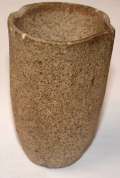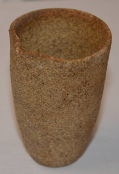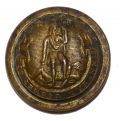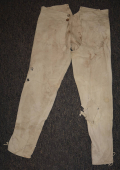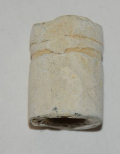site search
online catalog
Relics
Showing 201 to 220 out of 305
MODEL 1855/61 GUN TOOL ONCE OWNED BY J. HOWARD WERT
Recovered at Gettysburg, this is a complete Model 1855/61 gun tool. It is heavily rusted and the screwdriver tip is rusted tight. At the time of the Gettysburg campaign, twenty-two year-old John… (224-798). Learn More »
MID 19th CENTURY CRUCIBLE ONCE OWNED BY J. HOWARD WERT
One of many articles amassed by Wert after the Battle of Gettysburg. A crucible is also a container in which metals are melted, usually for temperatures above 500 °C. Crucibles are made of graphite… (224-794). Learn More »
MID 19th CENTURY CRUCIBLE ONCE OWNED BY J. HOWARD WERT
One of many articles amassed by Wert after the Battle of Gettysburg. A crucible is also a container in which metals are melted, usually for temperatures above 500 °C. Crucibles are made of graphite… (224-793). Learn More »
SCARCE CIVIL WAR ISSUE SHOE ALTERED TO CAMP/BARRACKS SHOE
The army did not issue “post,” “barracks,” or “camp” shoes until the 1880s. Before that it was up to soldiers to privately purchase or improvise footwear that might prove more comfortable… (1052-426). Learn More »
U.S. ARMY MODEL 1892 CURB BIT ONCE OWNED BY J. HOWARD WERT
This piece of US horse equipment is an original U.S. Army curb bit of the 1892 First Pattern, (a.k.a. the Whipple Bit) and was once owned by Gettysburg native J. Howard Wert. In strong condition, this… (224-790). Learn More »
U.S. MODEL 1874 CAVALRY CURB BIT ONCE OWNED BY J. HOWARD WERT
This piece of original US horse equipment is an original U.S. cavalry curb bit of the 1874 pattern. In strong condition, this iron bridle bit has a hard pockmarked surface with moderated rust pitting.… (224-788). Learn More »
POST-WAR VIRGINIA STAFF OFFICER’S BUTTON BY HORSTMANN
This three-piece coat size Virginia button has substantial gilt left on the face and good detailing of the figures of the Virginia state seal and the motto on a ribbon on a lined background with an… (1000-2250). Learn More »
$115.00
Originally $145.00
SCARCE INDIAN WAR US ARMY 1872 PATTERN SHOE: FORT PEMBINA, NORTH DAKOTA, ESTABLISHED 1870
New pattern shoes and boots were introduced in the U.S. Army in 1872 and in use until the 1880s. These shoes improved upon Civil War issue patterns mainly by using brass screws in the soles, rather… (1052-303). Learn More »
SCARCE INDIAN WAR US ARMY 1872 PATTERN SHOE WITH FIELD REPAIR
New pattern shoes and boots were introduced in the U.S. Army in 1872 and in use until the 1880s. These shoes improved upon Civil War issue patterns mainly by using brass screws in the soles, rather… (1052-576). Learn More »
EXCAVATED MODEL 1855 PISTOL CARBINE PART
This unusual weapon consisted of a large single shot pistol that had a detachable shoulder stock which theoretically transformed it into a carbine. Here are two excavated brass parts from the pistol… (1000-1147). Learn More »
$260.00
Originally $325.00
VERY RARE CIVIL WAR U.S. ARMY ISSUE DRAWERS
Civil War army-issue undergarments are extremely rare. They were made and issued in huge numbers, but were characteristically cheaply made, often disliked, and hardly worth preservation as a cherished… (1052-255). Learn More »
“FORTY MILES A DAY ON BEANS AND HAY IN THE REGULAR ARMY-O” SCARCE INDIAN WAR US ARMY 1872 PATTERN SHOE FROM FORT PEMBINA, N.D.
New pattern shoes and boots were introduced in the U.S. Army in 1872 and in use until the 1880s. These shoes were similar to Civil War issue patterns, with square toe, rough-side out black leather… (1052-292). Learn More »
EARLY BARRACKS OR CAMP SHOE BY JOHN MUNDELL OF PHILADELPHIA
This is a usual soldier’s shoe from Fort Pembina, ND, a small U.S. army post from 1870 to 1895, and is typical army construction using rough-side out black leather and is clearly stamped “J.… (1052-388). Learn More »
SCARCE INDIAN WAR US ARMY 1872/76 PATTERN CAVALRY BOOT FROM FORT PEMBINA, N.D.
This scarce Indian War U.S. cavalry boot actually comes from Fort Pembina, a small U.S. Army frontier fort in North Dakota in operation from 1870 to 1895. The army introduced new shoe and boot… (1052-304). Learn More »
DUG 19TH CENTURY BRASS PROTRACTOR FOUND AT GETTYSBURG BY THE LATE RON MILLER
This small brass protractor meas. approx. 3.50 x 1.75 inches. The arc still shows faint measured graduations. Bottom center has a partial Philadelphia maker’s mark. Item was dug by the late Ron… (286-1212). Learn More »
FIRST EDITION REFERENCE BOOK ON VIRGINIA COLONIAL RELICS FROM THE LIBRARY OF THE LATE DEAN S. THOMAS
The title of this volume is “DISCOVERING VIRGINIA’S COLONIAL ARTIFACTS. A COMPREHENSIVE GUIDE TO RECOVERY, IDENTIFICATION AND PRESERVATION” by Bill Dancy and published by Greybird Publishers of… (236-444). Learn More »
RELIC FRIZZEN RECOVERED FROM THE 1793 BATTLEFIELD OF WORTH
Frizzen is complete but rusted throughout. There were two battles fought at Worth, the first was part of the French Revolution in 1793 and the second was during the Franco-Prussian War in 1870. This… (1202-54). Learn More »
CONFEDERATE GARDNER BULLET THAT WAS PULLED?
Here is an odd bullet. It started out as a .58 caliber, two-groove, Gardner bullet. It was definitely “pulled” but the question is, by what? The nose of the bullet is now flat with a large… (2023-1985). Learn More »
SELECTION OF RELICS (BULLETS, CANISTER BALLS AND HORSE SHOES) RECOVERED AT APPOMATTOX BY CHRIS CALKINS, NPS HISTORIAN AND BATTLEFIELD PRESERVATIONIST
These bullets, canister balls, and horse shoes were dug by Chris Calkins at Appomattox. Through family connections to Appomattox and the relationships he built while working there and conducting…. Learn More »
RELIC .52 CALIBER SHARPS BULLET MOLD
Iron, scissor-type bullet mold that cast a single .52 caliber “New Model” Sharps bullet. Mold measures approximately 9” overall. Nippers are on the front end of the mold block. Iron was cleaned… (236-192). Learn More »
Showing 201 to 220 out of 305
Most Popular
Historical Firearms Stolen From The National Civil War Museum In Harrisburg, Pa »
Theft From Gravesite Of Gen. John Reynolds »
Selection Of Unframed Prints By Don Troiani »
Fine Condition Brass Infantry Bugle Insignia »
featured item
A LOUISIANA CONFEDERATE ARTILLERY CAPTAIN'S FROCK COAT
This is an outstanding example that was until recently in the Fort Worth Texas Civil War Museum. The coat is double breasted and made of a dark gray wool satinet. There are seven Louisiana state seal buttons in two rows of 7 on the front. The… (1268-557). Learn More »




